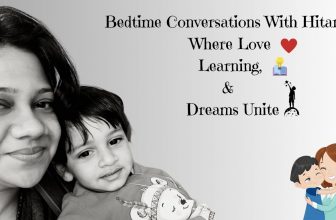Help Your Baby Sleep Through The Night – Few Tips & Tricks

Having a baby is the most wonderful feeling on Earth. Parents are on cloud nine once they embrace parenthood. Along with happiness, it also brings a lot of challenges with it. One of the biggest challenges is baby sleep. Making your baby sleep is one of the toughest challenges that maximum parents face. My own baby used to sleep throughout the day, but it was super active at night.
Hours of Baby Sleep
A newborn baby sleeps 14 – 18 hours a day. Sometimes, at a stretch, they sleep for 3-4 hours. Let’s see the sleeping habits in babies based on their age:
Newborn
Newborn babies get up more frequently as they need to be fed at regular intervals.
2 to 4 months old
As the child grows, they tend to sleep for a longer time. A 2–to 4-month-old child sleeps for 5-6 hours at a stretch. They hardly feed once or twice at night.
4 months old
A 4-month-old baby can easily have asleep for 7 – 8 hours as they hardly require feeding at night.
5- to 6-month-old
A 5-to-6-month baby can easily sleep through the night if he is not hungry. Before bed, a well-fed baby sleeps peacefully and will not get up at night.
Parents following a proper bedtime routine help their kids to sleep easily, sleep better and cry less often at night. It is important to start a proper and regular bedtime routine as soon as possible. When the child is 6 to 8 weeks old, parents must include some bedtime activities to make the baby sleep on time so that even the parents can get proper rest, especially mothers. Here are some Self Sleep Training Methods & Guide By A Mommy Blogger.
Steps to be Followed to Make the Baby Sleeps on Time
- Keep the child busy during the day. Play some active games with him during the day.
- Play some quiet games in the evening as the child must be tired.
- Give an oil massage to the child every evening. This keeps the baby relaxed and didn’t feel any pain in the body. I have always used olive oil for massaging my baby, and believe me; it shows miracles.
- Once the child is in bed, the room’s lights should be dim. Also, make sure any kind of talking or disturbance is not there in the room. Too much stimulation will make it difficult for the baby to sleep again, and they may get cranky.
Things that Prevent the Baby from Sleeping
Sickness
Cold, cough, or fever may keep the child awake and make him cranky. Babies sleep better when they feel better.
Room Temperature
If the room is very hot or quite cold, the baby may have problems sleeping. The room temperature should be ideal so that the baby sleeps comfortably.
Clothes
The child should wear loose and comfortable clothes to make the baby sleep for a longer time.
Hazards
Avoid items like chargers, ribbons, and hard toys on the bed or crib where the baby sleeps. They could be harmful if they are within the baby’s reach.
TV and Gadgets
Avoid using TV, mobile phones, and gadgets at night. Baby sleep can be interrupted because of these gadgets.
Stories and Book Reading
You can read a book to the child, or parents can also narrate short moral stories. This keeps the child happy, and the baby will sleep in a soothing way.
Appropriate Sleep Environment
One common mistake we parents commit is that we do not keep the child’s bed ready before sleeping. There is no magic to solve night workings. Having a good sleep environment helps the baby sleep for a longer time.
Three main elements should always be there in the baby’s bedroom:
- First, ensure there is no light in the baby’s bedroom. The room should be dark all the time, even in the morning. The sunlight reacts with our organs and sends a message to the brain that it is the time to wake up. All the windows should be covered so that no light can enter while the baby sleeps.
- Secondly, toys with sounds should not be kept around the child while the baby sleeps. If they are touched or pressed, they can produce sounds, interrupting the baby’s sleep. Adults can put themselves back to sleep when woken by the sound, but the baby is resistant to sleep.
- Thirdly, the crib or the bed where the baby sleeps should have a flat mattress with no inclination or elevations. A crib should have a snugly fitting mattress and a tightly fitted sheet.
These three elements are needed by all babies to enjoy healthy sleep throughout their infancy and toddlerhood.
Newborn Sleep
For every new mom, sleep training a newborn is hard, and in a few cases, it may be impossible. Newborn baby sleep is not necessary for the first sixteen weeks. Until the newborn is happy and healthy, I would advise parents not to pursue sleep training until the child is atleast sixteen years old.
It has always been advised that a newborn baby should be put to sleep on their stomach, resulting in rousing less frequently in newborns. Also, the baby gets longer stretches of uninterrupted sleep, and he can easily fall back to sleep without assistance. Check out these 15 simple ways new dads can help new moms.
One point should be made clear at this stage. A newborn baby sleeps more easily on their stomach, but all the babies should be put to sleep on their backs till the baby turns one year old. The risk of suffocation may increase if the babies sleep on their stomachs.
Conclusion
In conclusion, the following points can help not only in getting the adequate sleep a baby needs but also in laying the foundation for future sleep:
- Figure out how your baby likes to sleep.
- Whenever the baby sleeps, safety has to be of utmost concern. The crib/bed has to be flat with no bumpers, toys, or unnecessary things near the baby.
- It is advisable to try and avoid relying on feeding as the baby grows. Feeding to sleep can be tricky to extricate yourself from, so it is often better to avoid feeding as soon as possible.








